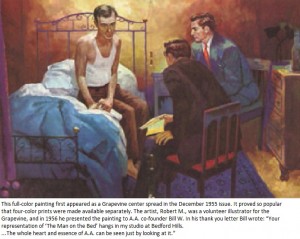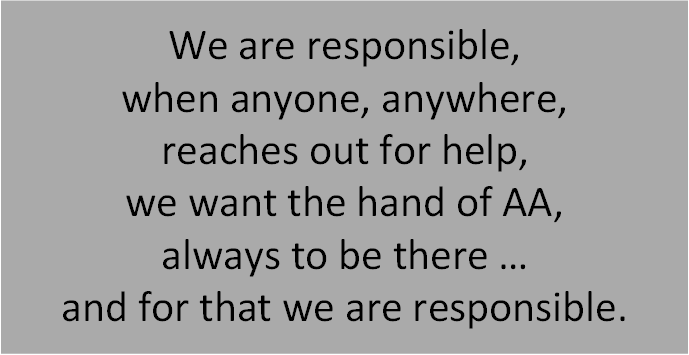Do you ever wonder what it would have been like to be twelfth-stepped by Bill W. and Dr. Bob? Well, Bill D., a well-known attorney and Akron city councilman, who in the summer of 1935 had once again been admitted to Akron City Hospital, in DTs and strapped to a gurney this time, having already punched out two nurses, described it this way some years after the fact.
“I looked up and there’s two great big fellows over six foot tall, very likable looking,” said Bill in a conversation he had with Bill W. in 1953. “Before very long we began to relate some incidents of our drinking and, naturally, pretty soon, I realized both of you knew what you were talking about…. A lot of folks tried to talk to me about my drinking — the fact is, they’d come around…and I’d just dry up and wouldn’t listen to them. They told me I ought to quit. Of course, I knew that much better than they did, because on top of all the things they knew, only I knew how sick I got.
“Both of you were very likable fellows, and after a while I remember that I had been doing quite a bit of the talking…. So, after hearing some of my story, you turned around and said to Doc — I don’t think you knew I heard you, but I did — you said, ‘Well, I believe he’s worth saving and working on.’”
Bill D., who later came to be known in A.A. circles as the “Man on the Bed,” continued. “You both said to me, ‘Do you want to quit drinking? It’s none of our business about your drinking. We’re not up here trying to take any of your rights or privileges away from you, but we have a program whereby  we think we can stay sober. Part of that program is that we take it to someone else that needs it and wants it. Now, if you don’t want it, we’ll not take up your time, and we’ll be going and looking for someone else.’”
we think we can stay sober. Part of that program is that we take it to someone else that needs it and wants it. Now, if you don’t want it, we’ll not take up your time, and we’ll be going and looking for someone else.’”
They then asked Bill a number of questions. Did he think he could quit of his own accord, without any help? Did he believe in a higher power and, if so, would he be willing to go to this higher power and ask for help?
They left this with Bill to think over and, as he lay in the hospital bed, he went over his drinking history in his mind.
“I reviewed what liquor had done to me…the opportunities that I had discarded, went over the possibilities and things that had been given me and how I had wasted them, and I finally came to the conclusion that if I didn’t want to quit, I certainly ought to want to quit….”
When the two twelfth-steppers returned sometime later, Dr. Bob asked Bill if he wanted to quit drinking. “‘Yes, Doc,’” said Bill, “‘I would like to quit, at least for five, six or eight months, until I get things straightened up, and begin to get the respect of my wife and some other people back, get my finances fixed up, and so on.’”
Bill W. and Dr. Bob both laughed heartily. Then, according to Bill, one of the two turned to him. “‘We’ve got some bad news for you. It was bad news for us, and it will probably be bad news for you. Whether you quit six days, months, or years, if you go out and take a drink or two you’ll end up in this hospital, tied down, just like you have been in these past six months. You are an alcoholic.’
“As far as I know that was the first time I had ever paid any attention to the word. I figured I was a drunk. And you said, ‘No, you have a disease, and it doesn’t make any difference how long you do without it, after a drink or two you’ll end up just like you are now.’ That certainly was disheartening news, at the time.”
The next thing Bill W. and Dr. Bob asked was whether or not Bill thought he could quit for 24 hours. “‘Sure …anybody can do that, for 24 hours,’” said Bill. “‘That’s what we’re talking about. Just 24 hours at a time,’” the two A.A. co-founders said. “That sure did take a load off my mind,” said Bill. “Every time I’d start thinking about drinking, I wouldn’t think of long, dry, arid years without having a drink, but this idea for 24 hours.”
Noting that Bill W. and Dr. Bob seemed genuinely happy to be sober, Bill said, “You seemed to be so well pleased with your sobriety, and you looked it and seemed to talk so confidently yourselves that, really, after a day or two I began to, along with my wife, have confidence, at least to a certain extent, that it could be done… I wasn’t afraid that the program wouldn’t work, but I still was doubtful whether I would be able to hang on to the program. But I did come to the conclusion that I was willing to put everything I had into it….
“I remained in the hospital eight days. During those eight days I had raw sauerkraut and raw tomatoes the whole time. On the Fourth of July, Doc came by the hospital and I had a friend who had told me I could have her cottage for a week out at the lakes.” Piling into a car, Bill W., Dr. Bob and his wife, and Bill and his wife all went together out to the cottage. “There wasn’t any liquor around. For the first week it was rather tough. The other folks would come out and visit us most every day, and we would go over on a little island there and take a picnic lunch and sit around and try to devise a means of staying sober, in addition to what we already had. Naturally, the fellowship and being busy all the time was a great help. I was out there for more than a week and was helped a lot by these fellows coming out there. It was rather rough, but I still was willing and still wanted to go ahead and get rid of this problem I had….
“Of course, as time went on, I began to get my health back and began to feel I didn’t have to hide from people all the time….
“I still go to meetings,” said Bill from the vantage point of many years of sobriety. “Because I like to go. I meet the people that I like to talk to. Another reason that I go,” he concluded, “is that I’m still grateful for those good years that I’ve had.”
Bill D. died in Akron on September 17, 1954. In memoriam, Bill W. wrote, “That is, people say he died, but he really didn’t. His spirit and works are today alive in the hearts of uncounted A.A.s, and who can doubt that Bill already dwells in one of those many mansions in the great beyond. The force of the great example that Bill set in our pioneering time will last as long as A.A. itself.”
Originally published in News and Notes from the General Service Office of A.A. ® Box 459 Vol. 58, No. 1 / Spring 2012 www.aa.org



